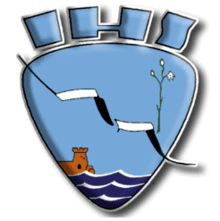College of the Immaculate, Alicante
| College of the Immaculate, Alicante Colegio Inmaculada | |
|---|---|
 | |
| Location | |
| Alicante, Spain | |
| Information | |
| Type | Jesuit, Catholic |
| Denomination | All faiths |
| Established | 1954 |
| Director | Roberto Garrido Bullejos |
| Staff | 136 |
| Grades | Ages 3 to 18 |
| Gender | Coeducational |
| Enrollment | 1,800 |
| Predecessor | College of Santo Domingo, Orihuela (1872) |
| Jesuit reps | Manuel Ferrer, Pedro Garcis Vera |
| Website | InmaculadaSpain |
College of the Immaculate, Alicante, Spain, was founded by the Society of Jesus in 1954. It is coeducational and includes three-year-olds through primary, secondary (ESO), and baccalaureate.
History
Jesuit educational work in the province of Alicante dates back to the founding of the College of Our Lady of Hope in the late 17th century. With the suppression of the Jesuits in 1767 this work was interrupted.
In 1872 the Jesuits settled in Orihuela at the College of Santo Domingo, at the request of the Bishop. Then in 1921, with a desire to found a school in the capital city Alicante, Jesuits purchased land in the Benalúa neighborhood there, but lack of funds delayed further progress. Not until 1954 was the school opened, and named after the Immaculate Conception in honor of that year's centenary of proclamation of the Catholic dogma. In 1956 the Jesuits left the College of Santo Domingo in Orihuela and joined Inmaculada, on Avenida de Denia on the road to Valencia.
The grounds of the building covered 124 acres and the building area was 16,000 m2. Designed for 750 students, it initially welcomed 557 (158 from the capital), 32 Jesuits, and 13 lay people on the staff. The initial construction included a pavilion, auditorium, and sports facilities. A hall with seating for 1,200 would follow.
In 1959 Inmaculada Stadium opened, with 6000 in attendance at a football match. A swimming pool was added in 1964. In the course of the 1980s the college became completely coeducational. A new nursery school was opened in 2004. The current capacity of the College in 2016 was over 1800 students, ages 3 to 18 years.[1] The College educates in Ignatian spirituality and pedagogy, with the ultimate aim of forming "men and women for others."[2] The College has an active alumni association.[3]
The school has gone through a process of planning for the future, with its main goal a more interactive and contrextualized learning.[4] In 2016 it was rated sixth among the schools in Valencia[5] and among the 100 best schools in Spain.[6]
Pastoral activities
A day to build on relationships and spiritual growth is held at the start of the year from 3rd year ESO through 2nd year baccalaureate. Activities are organized during a week in January leading up to the Friday celebration of the international day for peace. Also the school's Jesuit heritage is celebrated through a week of talks and activities in March, culminating on Friday with the Eucharist and with various sports and cultural activities. And various solidarity campaigns are held, including one provided by Jesuit NGO Entreculturas.
Students in grades 5 and 6 and again in secondary 1 and 2 have group Growing Together exercises to foster growth in faith. Group meeting sessions are supplemented variously by Sunday excursions and camping trips,
The school Youth Network offers volunteering opportunities beginning with 3rd year ESO. This includes opportunities offered by Entreculturas as well as assisting with the younger children in the school and at camps. Volunteers undergo training for these tasks.
Students volunteer to help with various programs in Alicante: at a pool for the physically handicapped; at S. Rafael center for the mentally handicapped; at Virgen del Remedio home for he elderly; and with classes in the parishes preparing students for exams.
First year ESO students have a 3-day excursion to Camp Ador (Gandía) at the end of second quarter. The focus is on self-knowledge and appreciation for others, shared prayer, and finding Jesus in others.
At the end of 2nd ESO students can attend Camp Oto (Huesca) in the Aragonese Pyrenees for 7 days to grow together in friendship, service, joy, and faith. Openness to nature is integral to the program, with hikes to places of natural beauty in Ordesa Valley and its surroundings.
After their 1st year, baccalaureate students have an opportunity to make the 13-day Way of Saint James pilgrimage. The last third takes them from Astorga to Santiago de Compostela. This involves austere living and being sensitized to the beauties of nature, along with an exercise in peaceful coexistence.[7]
References
- ↑ "Libro "Inmaculada – Santo Domingo, Siglo XX"". Asociación Antiguos Alumnos Jesuitas Alicante (in Spanish). 2008-06-25. Retrieved 2016-12-31.
- ↑ Administrador. "Colegio Inmaculada (Alicante)". www.educacionjesuitas.es. Retrieved 2016-12-31.
- ↑ "Asociación Antiguos Alumnos Jesuitas Alicante". Asociación Antiguos Alumnos Jesuitas Alicante (in Spanish). Retrieved 2016-12-31.
- ↑ INFORMACION. "Alicante - Informacion.es - Hemeroteca 18-04-2007". www.diarioinformacion.com. Retrieved 2016-12-31.
- ↑ "El Mundo ranking for UNICEF". Retrieved 31 December 2016.
- ↑ "Un año más el colegio de la Inmaculada entre los 100 mejores de España". www.aacolegioinmaculada.es. Retrieved 2016-12-31.
- ↑ "Actividades". Colegio Inmaculada Jesuitas de Alicante. Retrieved 2016-12-31.
Coordinates: 38°21′39.97″N 0°27′51.5″W / 38.3611028°N 0.464306°W